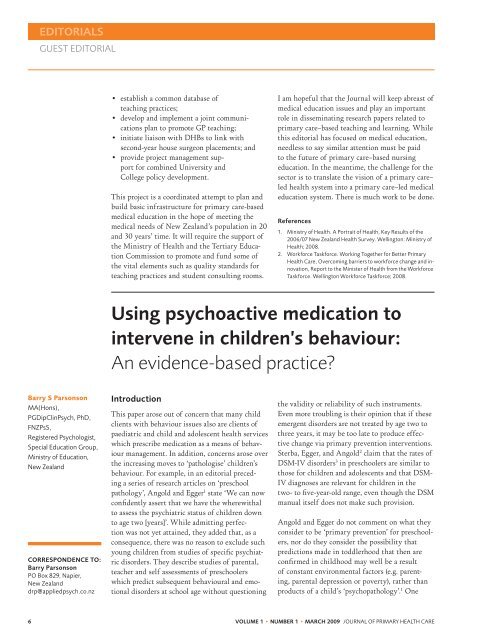entire issue. - The Royal New Zealand College of General ...
entire issue. - The Royal New Zealand College of General ...
entire issue. - The Royal New Zealand College of General ...
Create successful ePaper yourself
Turn your PDF publications into a flip-book with our unique Google optimized e-Paper software.
EDITORIALs<br />
GUEsT EDiTORiAL<br />
Barry S Parsonson<br />
MA(Hons),<br />
PGDipClinPsych, PhD,<br />
FnZPss,<br />
Registered Psychologist,<br />
special Education Group,<br />
Ministry <strong>of</strong> Education,<br />
new <strong>Zealand</strong><br />
CORREsPOnDEnCE TO:<br />
Barry Parsonson<br />
PO Box 829, napier,<br />
new <strong>Zealand</strong><br />
drp@appliedpsych.co.nz<br />
• establish a common database <strong>of</strong><br />
teaching practices;<br />
• develop and implement a joint communications<br />
plan to promote GP teaching;<br />
• initiate liaison with DHBs to link with<br />
second-year house surgeon placements; and<br />
• provide project management support<br />
for combined University and<br />
<strong>College</strong> policy development.<br />
This project is a coordinated attempt to plan and<br />
build basic infrastructure for primary care-based<br />
medical education in the hope <strong>of</strong> meeting the<br />
medical needs <strong>of</strong> <strong>New</strong> <strong>Zealand</strong>’s population in 20<br />
and 30 years’ time. It will require the support <strong>of</strong><br />
the Ministry <strong>of</strong> Health and the Tertiary Education<br />
Commission to promote and fund some <strong>of</strong><br />
the vital elements such as quality standards for<br />
teaching practices and student consulting rooms.<br />
I am hopeful that the Journal will keep abreast <strong>of</strong><br />
medical education <strong>issue</strong>s and play an important<br />
role in disseminating research papers related to<br />
primary care–based teaching and learning. While<br />
this editorial has focused on medical education,<br />
needless to say similar attention must be paid<br />
to the future <strong>of</strong> primary care–based nursing<br />
education. In the meantime, the challenge for the<br />
sector is to translate the vision <strong>of</strong> a primary care–<br />
led health system into a primary care–led medical<br />
education system. <strong>The</strong>re is much work to be done.<br />
Using psychoactive medication to<br />
intervene in children’s behaviour:<br />
An evidence-based practice?<br />
Introduction<br />
This paper arose out <strong>of</strong> concern that many child<br />
clients with behaviour <strong>issue</strong>s also are clients <strong>of</strong><br />
paediatric and child and adolescent health services<br />
which prescribe medication as a means <strong>of</strong> behaviour<br />
management. In addition, concerns arose over<br />
the increasing moves to ‘pathologise’ children’s<br />
behaviour. For example, in an editorial preceding<br />
a series <strong>of</strong> research articles on ‘preschool<br />
pathology’, Angold and Egger 1 state ‘We can now<br />
confidently assert that we have the wherewithal<br />
to assess the psychiatric status <strong>of</strong> children down<br />
to age two [years]’. While admitting perfection<br />
was not yet attained, they added that, as a<br />
consequence, there was no reason to exclude such<br />
young children from studies <strong>of</strong> specific psychiatric<br />
disorders. <strong>The</strong>y describe studies <strong>of</strong> parental,<br />
teacher and self assessments <strong>of</strong> preschoolers<br />
which predict subsequent behavioural and emotional<br />
disorders at school age without questioning<br />
References<br />
1. Ministry <strong>of</strong> Health. A Portrait <strong>of</strong> Health, Key Results <strong>of</strong> the<br />
2006/07 new <strong>Zealand</strong> Health survey. Wellington: Ministry <strong>of</strong><br />
Health; 2008.<br />
2. Workforce Taskforce. Working Together for Better Primary<br />
Health Care, Overcoming barriers to workforce change and innovation,<br />
Report to the Minister <strong>of</strong> Health from the Workforce<br />
Taskforce. Wellington Workforce Taskforce; 2008.<br />
the validity or reliability <strong>of</strong> such instruments.<br />
Even more troubling is their opinion that if these<br />
emergent disorders are not treated by age two to<br />
three years, it may be too late to produce effective<br />
change via primary prevention interventions.<br />
Sterba, Egger, and Angold 2 claim that the rates <strong>of</strong><br />
DSM-IV disorders 3 in preschoolers are similar to<br />
those for children and adolescents and that DSM-<br />
IV diagnoses are relevant for children in the<br />
two- to five-year-old range, even though the DSM<br />
manual itself does not make such provision.<br />
Angold and Egger do not comment on what they<br />
consider to be ‘primary prevention’ for preschoolers,<br />
nor do they consider the possibility that<br />
predictions made in toddlerhood that then are<br />
confirmed in childhood may well be a result<br />
<strong>of</strong> constant environmental factors (e.g. parenting,<br />
parental depression or poverty), rather than<br />
products <strong>of</strong> a child’s ‘psychopathology’. 1 One<br />
6 VOLUME 1 • nUMBER 1 • MARCH 2009 J OURnAL OF PRiMARY HEALTH CARE

















